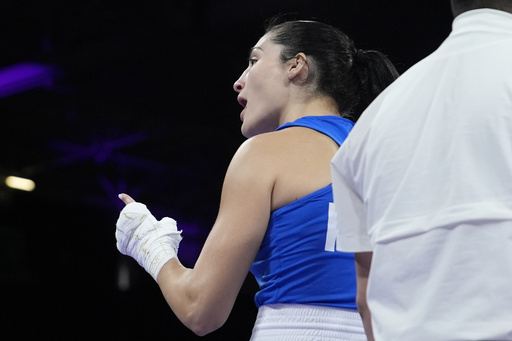LGBTQ+ individuals within the sports world are expressing concerns about the surge of derogatory comments misidentifying a female boxer at the Paris Olympics as transgender or male, which could potentially jeopardize the LGBTQ+ community and female athletes. The backlash targeted Algerian boxer Imane Khelif after her Italian opponent Angela Carini withdrew from their fight, with false claims circulating on social media that Khelif was a man competing against a woman. This incident has also drawn Taiwanese boxer Lin Yu-Ting into the broader discourse about women in sports.
According to International Olympic Committee spokesperson Mark Adams, Khelif is a cisgender female who has always identified, lived, and competed as a woman. Adams cautioned against turning the situation into a witch hunt. Some athletes and LGBTQ+ advocates are apprehensive that the critical comments and the IOC’s failure to address the rising global discussion prior to the Olympics have begun to demonize transgender, nonbinary, and other LGBTQ+ individuals at an event emphasizing inclusivity. This issue arises amidst evolving understandings of gender identity, leading to heated debates, particularly in the realm of sports.
Despite the Paris Olympics promoting openness and featuring a record number of 193 openly LGBTQ+ athletes, an opening ceremony performance by drag queens was heavily criticized by religious conservatives and others who claimed it mocked the “Last Supper” painting by Leonardo da Vinci. Some performers and the ceremony’s artistic director reported receiving threats. Nikki Hiltz, a prominent middle-distance runner for the U.S. Olympic team, who identifies as nonbinary, has also been subjected to hateful remarks firsthand, reflecting the prevalent transphobia amid the Games.
Criticism surrounded Khelif and Lin stemmed from the International Boxing Association alleging that the athletes failed unspecified eligibility tests for women’s competition, a decision the IOC deemed abrupt and unsupported. Unlike some sports with clear guidelines for transgender athletes, boxing’s criteria date back to the 2016 Olympics, relying solely on an athlete’s passport gender marker amid tensions between the IBA and the IOC. The IOC emphasized the need to protect athletes from online aggression and misinformation.
Cyd Zeigler, co-founder of Outsports, noted that the lack of clarity from the IOC prior to the Games has negatively impacted both female athletes and LGBTQ+ participants. Zeigler stressed that the focus should not be on the athletes but on those establishing the policies. The IOC’s failure to address these issues in a timely manner threatens to impede LGBTQ+ involvement in future Olympics, despite significant progress made in recent years. The vitriol and graphic language surrounding the discourse trouble advocates who believe in having constructive discussions about the inclusion of trans athletes.
Former athletes, like Belgium’s Charline Van Snick, expressed concern that the scrutiny and comments regarding the athletes’ bodies are undermining the efforts made by female athletes to combat stigmas. While progress has been observed, incidents like Ilona Maher of the U.S. women’s rugby team facing accusations of being male highlight the persistent challenges. Van Snick emphasized the importance of recognizing different body types in sports and urged for respectful discourse amid the ongoing debates.
